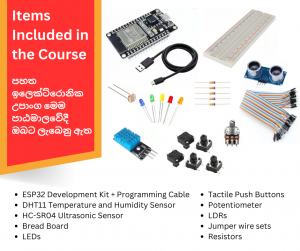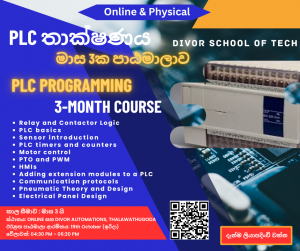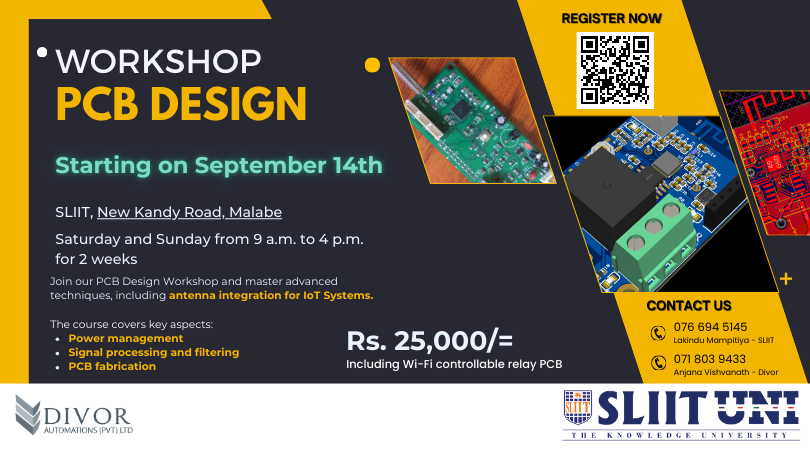About Divor School of Tech
At Divor Academy our objective is to provide technical as well as practical knowledge on Electronics and Automation related areas. Course are structured so that students can select which course best fits their needs and current knowledge levels.
Basics Arduino Robotics
Arduino is a popular open-source electronics platform used for building and programming robots. It provides an easy-to-use software environment and hardware components for rapid prototyping and development of robotics projects.
Electronic Design Automation
A PCB design course teaches the skills and knowledge needed to create and manufacture printed circuit boards (PCBs) for electronics projects. The course covers topics such as schematic capture, PCB layout, component placement, routing, and verification.
Industry Oriented
An industry-oriented electronics course is a specialized training program that focuses on the practical application of electronics in a specific industry. The course covers the design, development, and implementation of electronics systems and solutions, and provides hands-on experience with industry-standard tools and techniques.
Otto Robot
Otto DIY is the robot that you can make, build, program and design while learning the technology skills of the future STEM and creative thinking. Otto is an interactive robot that anyone can make! Otto walks, dances, makes sounds and avoids obstacles. Learn the fundamentals of programming, mechanics, electronics, design, Internet of Things educational content to make you a robotics master in a fun way!
PLC Course (3-months)
Course Duration: Total 40 hrs (3-months)
- Online lectures: 8 days, 2 hours each (Total 16 hrs)
- Hands on Practicals: 4 sessions, 6 hours each (Total 24 hrs)
Next batch start date: 19th October (Sunday), 4:30 pm – 6:30 pm
Location(s):
- Theory/Lectures: Online via Zoom
- Practicals: Divor Automations, Thalawathugoda Location Pin
📚 Following Sections are covered in this 3-month course:
1. Relay and Contactor Logic:
- Relay workings, Types of relays, Normal working conditions
- Relay latching circuits
- Contactor logic, DOL wirings, Contactor interlocking mechanisms (Star delta and forward reverse circuits)
- Other controllers (Batch counters, temperature controllers, etc)
2. PLC basics:
- Mostly done using Xinje XC Series programming tool with XC3-24RT-E PLC
- “Ladder logic” and Instruction “list programming” methods will be discussed
- Demonstrations and later practicals of digital inputs (buttons) and outputs (LEDs and Relays)
- Different circuits of inputs and outputs
- Discussion of normally open and normally close input blocks
3. Sensor introduction:
- Types of different digital sensors
- Tactile sensors (limit switches)
- Proximity sensors (capacitive, inductive sensors)
- Photoelectric sensors (through beam, reflector type, diffuse type sensors)
- Interfacing these with PLCs and making circuits
4. PLC timers and counters:
- Types of timers and counters
- Making on-delay and off-delay applications with timer blocks
- Using different counters for specific applications (forward only, forward/reverse counters. Fast counters, etc)
- Using retention and non-retention type counters and timers
5. Motor control:
- Types of motors DC, AC (single and three phase), stepper, servo motors
- AC motor on/off demonstrations
- AC motor speed control (with VFD)
- Configuring VFDs and integration with PLCs
6. PTO and PWM:
- Introduction to PTO and PWMs
- Introduction to stepper motors and wiring demonstration
- Using PTO to control stepper motors
7. HMIs:
- Practicals and demonstrations will be carried out with TouchWin TG765s-MT HMI
- Introduction to TouchWin EditTool software
- Setting up projects and pages in the HMI
- Integration with a PLC system
- PLC and HMI memory management
8. Adding extension modules to a PLC:
- Using Analog input cards
- Using analog input devices (potentiometers)
9. Communication protocols:
- Introduction to different communication protocols (Modbus RTU, Modbus Ethernet, Profibus, etc)
- Electrical wiring standards (RS-232, RS-485)
- Demonstrations with a Ultrasound sensor
10. Pneumatic Theory and Design:
- Introduction to pneumatic designs and common vernacular
- Making pneumatic circuits
- Demonstrations using double acting pistons and ⅗ solenoids
- Practicals and demonstrations will be carried out throughout the course
11. Electrical Panel Design:
- Common Conventions when wiring electrical panels
12. Introduction to other PLC brands and their programming software:
- Siemens TIA portal
- Schneider EcoStruxure Machine Expert
- Discussion of similarities and dissimilarities
🧰Hands on Practical sessions:
- Basic relay latching circuit
- DOL using contactors
- Star/delta and forward/reverse Contactor circuits
- PLC input and output examples
- Sensor integration to count items on a conveyor (Counters)
- Road crossing simulation for timer exercises (Timers)
- VFD and AC 3phase motor control exercises
- Stepper motor control (Rotate number of steps, speed control, etc)
- HMI integration exercises (Input values, display counties, on/off processors, etc)
📽️Final Project:
- Filling station system
- Pump control
- Water level and weight reading
- Overall system control using a PLC and a HMI
Course Fees
Course fees for the full 3-months: Rs. 30,000 /=
- Installment-1: Rs.10,000 (before the 1st class)
- Installment-2: Rs.10,000 (after 1 month)
- Installment-3: Rs.10,000 (after 2 months)
Discounted rate if paying full amount: Rs.25,000 /= (discounted rate)
Official Certificate at the end of the course and after completing the Final Project
![]()
We are registered with TVEC. Therefore you will get a World wide recognized certificate from TVEC as well.
How to make course payments ?
Bank Deposits
Bank of Ceylon
Name: DIVOR AUTOMATIONS (PVT) LTD
Account number: 0090695363
Bank of Ceylon
Lake view Branch (Branch code 612)
Commercial Bank
Name: DIVOR AUTOMATIONS (PVT) LTD
Account number: 1000108581
Commercial Bank Of Ceylon PLC
Colombo 07 (Branch code 50)
Online Credit/Debit card payments
After making the payment send below details via Whatsapp to +94777186354
● Payment receipt or confirmation message
● Your name
● Your contact number

Register before 19th of October (Sunday), 2025
For more information:
Contact:
1-Day PLC Workshop
Workshop Duration: 5 hours with 1 hour break ( 10:00 am – 03 pm)
Next workshop date: Will update here soon
Location: CHPB – Pelawatta, Battaramulla Location Pin
Section 1
- History and basics of automation
- Relay and contactor logic
- Issues in doing automation process this way
Section 2
- Advantages of PLCs
- Introduction to PLCs: modular and compact types, power, etc…
- Software introduction: XCP Pro
- Inputs and Outputs in PLCs: PNP and NPN types, set reset coils
- Inputs: Source and sink types
- 1st program: sending out signals
- Application: DOL, intro to memory coils
Section3
- Digital Sensors: Photoelectric sensors, Capacitive sensors, Inductive sensors, limit switches
- Application: Road crossing (with sensors and indicators)
Prerequisites
- Basic understanding of electronics.
- Electricity, voltage, resistance and capacitance
- Laptop
Learning Outcomes:
- Understand fundamental electronic components and their functions.
- Build basic circuits using relays and understand their limitations in automation.
- Introduction to PLCs and why they are necessary
- Learn how to control inputs and outputs using PLCs
- Learn basic digital sensors used in Industrial Automation
- Learn to automate simple tasks using PLCs
If you wish to join this 1-day workshop please fill this form and join our whatsapp group.
For more information:
Contact:
Online Course - Electronics, Arduino, MicroControllers & IoT
- This is an Online Course
- Next batch start date: Will notify here soon
- Course Duration: 3 Months
This course is conducted by Divor School of Tech a division of Divor Automations (Pvt) Ltd
In this course you will learn Electronics, Microcontrollers and Arduino programming
1.Introduction to Controllers
- Understand controllers and controller requirements
- Understanding inputs and outputs
- Code with the Arduino IDE and work with the ESP32 MCU and basic LEDs & pushbuttons
2. Logic Conditions and Analog and Digital Electronics
- Understand how loops and logic conditions work
- Identify Analog and Digital signals and work with them
- Program the Arduino to work with analog and digital logic
3.Sensors and modules
- Analyze types of sensors and their theories and parameters
- Integrate sensors and modules with Arduino
- Work with Arduino libraries
4.WiFi communication
- What is an API
- How to interface with an API
- Send and Receive data from ESP32
5.HTTP and MQTT Protocols
- Comparison between HTTP and MQTT protocols
- HTTP communication with ESP32
- MQTT communication with ESP32
6.IoT Platforms
- What are IoT platforms
- How to setup “Thingspeak” IoT platform for your projects
- Data visualization on “Thingspeak”
- Interfacing with “Thingspeak” via APIs
7.Final Project
- Send data to a backend service to visualize sensor data (Temperature, Humidity, Heat, Proximity)
- Receive weather data from cloud on current location and show conditions
- Interface with “Thingspeak” and visualize data
📽
Project at the end of the course
Course Fees
Option-1
Course Fees (with items) for the full 3 months: Rs 12,000 /=
Below Items are included in the Course Fees:

Option-2
Course Fees (without items) for the full 3 months: Rs 8000 /=
👨🎓
Official Certificate at the end of the course and after completing the Final Project
![]()
We are registered with TVEC. Therefore you will get a World wide recognized certificate from TVEC as well.
💳
How to make course payments ?
Bank Deposits
Bank of Ceylon
Name: DIVOR AUTOMATIONS (PVT) LTD
Account number: 0090695363
Bank of Ceylon
Lake view Branch (Branch code 612)
Commercial Bank
Name: DIVOR AUTOMATIONS (PVT) LTD
Account number: 1000108581
Commercial Bank Of Ceylon PLC
Colombo 07 (Branch code 50)
Online Credit/Debit card payments
https://techmart.io/product/electronics-arduino-and-microcontroller-programming-course/
💡
After making the payment send below details via Whatsapp to +94777186354
● Payment receipt or confirmation message
● Your name
● Your address (to send the items)
● Your contact number
⏳️
Register before 30th of March
PCB Design
Course Start Date – Will notify here soon
Course Duration – 2 weeks (Saturday and Sunday)
Course Location – Divor Automations (Pvt) Ltd, Pannipitiya, Colombo
Course Fees: Rs. 25,000 (Including Wi-Fi controllable relay PCB)
Workshop period – Total 24 hours ( 6 hours per day, Saturday and Sunday for 2-weeks) – Physical Lectures
Work Shop from 9AM to 4PM (Saturday and Sunday) including one hour lunch break
This workshop series aims to inculcate design and development skills in the field of Printed Circuit Board (PCB) production for those interested in the field of Mechatronics, specifically in the embedded systems and robotics industry.
PCB design course contain 3 main sections which covers all the main key aspects of PCB designing including power section, signal processing and filtering and PCB fabrication.
Course Coverage
- Basics of PCB design
- Introduction to EasyEDA software
- Learn about PCB components (Through hole technology and Surface mount technology)
Project based learning for introduction of software tools and PCB design methodologies
Project 1: Torch
- Introduction to PCB schematics and basics of DC electronic designs
- Your will get to design the PCB schematic and the Board using EasyEDA
- Learn how to troubleshoot PCBs using DRC check
Project 2: Power Supply
- Discussion of Power Regulation techniqnes
- Learn how to design and impliment a DC Buck regulator and design patters related to it
Project 3: Electronic Dice
- How to integrate Programmable ICs into a PCB: ATTiny85 micro controller
- Introduction to communication protocols: SPI used to upload programs to the controller
- Learn how to complete a simple PCB with a controller from start to finish
- Will discuss microcontroller program briefly which is uploaded to the ICs
Project 4: WiFi Relay
- Will design a PCB with an ESP32 microcontroller and a Relay to control any electrical appliance
- Will learn about WiFi data transmission
- How to implement a ESP32 microcontroller and the required antenna for wireless applications
- How to pair inductive loads like relays with microcontrollers in a safe manner
- Learn how to measure the effectiveness of Antenna using a VNA device
Each student will be handed a WiFi relay PCB and required components and they will get to solder the WiFi relay and finish the physical PCB which they will get to keep
Basics in Robotics
Course Duration: 3 months (72 hours)
Next course start date: Current batch is ongoing. Will notify here soon
This workshop series aims to inculcate project-oriented learning skills for those interested in the field of Mechatronics, specifically in the embedded systems and robotics industry. The primary aim of this workshop is to research, design and develop an Automated Guided Vehicle (AGV) based on the Arduino platform utilizing both electronic system design techniques and mechanical product development tactics.
In the duration of this course, you will cover the basics of programming, electronics and computer aided design software to elevate you in any technical field you are participating in.
Course fee: Rs.30,000 (can be paid in 2 installments, 1st day free)
Fees payment plan:
Full payment before enrollment: 20% off
Half payment before enrollment: 10% off
Lecturing period: 6 hours per week – Physical Lectures Broken down into two equal sessions for Electronic and Mechanical System Design
Day 1: Introduction to Arduino and AGV Design overview
Day 2: Analog and Digital Electronics, 2D and 3D Design Principles
Day 3: DC Motor control theory and application, AutoCAD 2D
Day 4: Sensors and modules, SolidWorks 2D
Day 5: Communication protocols and SolidWorks 3D
Day 6: Display Options SolidWorks 3D Assembly
Day 7: Wireless Communication and SolidWorks 3D Assembly continued
Day 8: Wireless Communication continued and practical AGV Design
Day 9: Collision Avoidance AGV design and development
Day 10: Line Following AGV design and development
Day 11: Line Following AGV development continued
Day 12: Bluetooth controlled AGV Design and development
- Official Certificate at the end of the course
For more information:
Contact:






